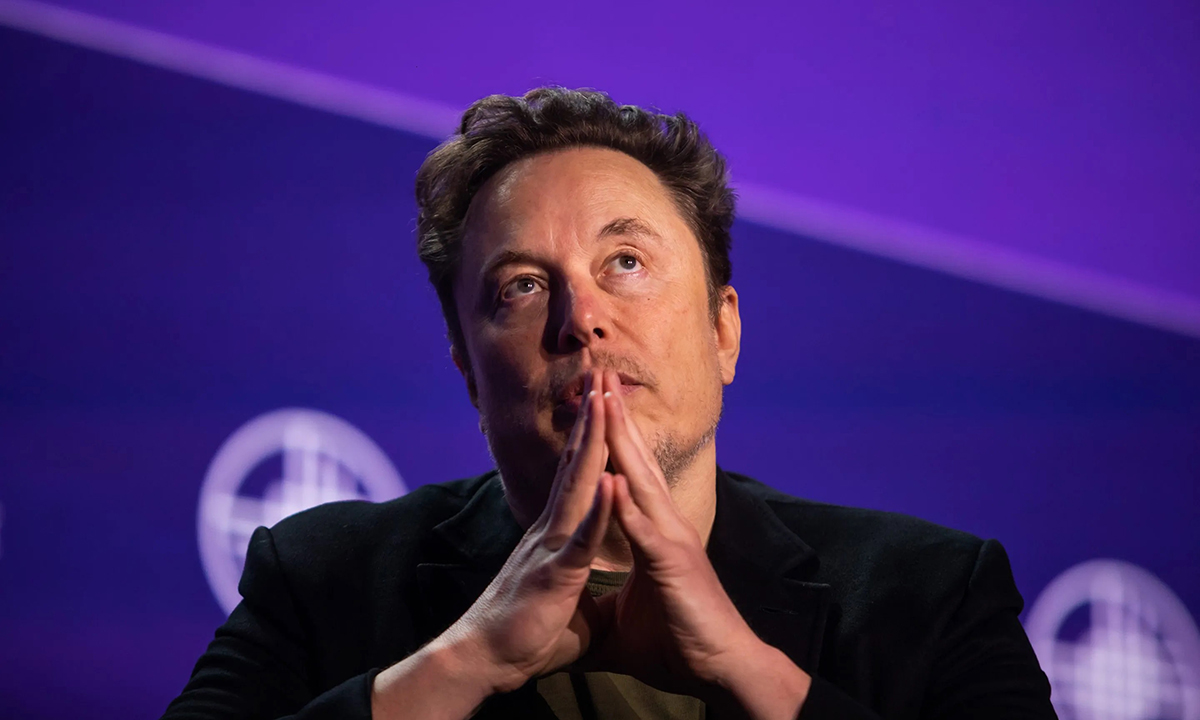
6月11日,苹果宣布将把OpenAI的ChatGPT集成到其技术中,特斯拉(Tesla)首席执行官埃隆·马斯克迅速做好防御准备以对抗这项竞争对手的技术。
马斯克曾是世界首富,他正在电动汽车制造商特斯拉和初创公司xAI开发自己的人工智能模型。
xAI已经发布了一个名为Grok的大型语言模型。
但ChatGPT不仅是马斯克自家产品的竞争对手,他本人还与这家由山姆·奥特曼(Sam Altman)领导的公司有过一段不愉快的历史。
马斯克是这家人工智能公司最早的支持者之一,并在公司成立之初(与奥特曼一起)担任首任联合主席。
2018年马斯克离职后,双方关系恶化。随之而来的是口水战和产品竞争,最终马斯克对奥特曼和OpenAI发起了一场持续的诉讼。
因此,当马斯克听到苹果宣布“将ChatGPT功能整合到iOS 18、iPadOS 18和macOS Sequoia的用户体验中,让用户无需在不同工具之间切换就能获得专业知识,并且使用图像和文档理解功能”时,他的愤怒也就不足为奇了。
马斯克在其社交媒体平台X(前身为Twitter)上表达了对这一合作关系的担忧。
他写道:"如果苹果在操作系统层面整合OpenAI,那么我旗下的公司将禁止使用苹果设备。这是不可接受的安全违规行为。”
“访客必须在门口交出他们的苹果设备,这些设备将被存放在法拉第笼中。”
法拉第笼是用来屏蔽某些电磁场的。
‘人工智能隐私新标准’
在加州举行的全球开发者大会(Worldwide Developers Conference)上,苹果概述了一系列与人工智能相关的隐私保护措施。
苹果首席执行官蒂姆·库克(Tim Cook)表示,该公司名为“苹果智能”(Apple Intelligence)的新人工智能战略和功能是公司的“下一个重大举措”,该公司还提出了人工智能隐私保护的“新前沿”。
这个名为“私有云计算”(PCC)的云智能系统旨在“确保发送到私有云计算的个人用户数据除了用户本人之外,任何人都无法访问,甚至苹果也无法访问。”
苹果在这份长达10页、近4000字的私有云计算公告中还承诺,该公司将在用户隐私方面 “做出更多努力”,这只是其人工智能安全战略的一部分。
在公布私有云计算系统的同时,这家市值约3万亿美元的公司还特别提到了与OpenAI有关的问题。苹果表示,独立专家可以对私有云计算系统进行检查以核实隐私保护措施的有效性。
该公司表示:“对于使用ChatGPT的用户,已经内置了隐私保护措施——他们的IP地址会被隐藏,OpenAI不会存储请求。ChatGPT的数据使用政策适用于选择连接其帐户的用户。”
OpenAI发布的公告与上述承诺相呼应:“在使用Siri和写作工具中访问ChatGPT时,内置了隐私保护措施——OpenAI不会存储请求,用户的IP地址也会被隐藏。”
马斯克似乎并不信服,尤其是考虑到苹果使用的是外部资源,而不是自己开发。
他在X上写道:“苹果没有足够的智慧来开发自己的人工智能,却不知何故能够确保OpenAI会保护你的安全和隐私,这显然是荒谬的。一旦苹果将你的数据交给OpenAI,就根本不知道会发生什么事情,它们会出卖你。”
苹果和OpenAI没有立即回应《财富》杂志的置评请求。
马斯克对苹果和OpenAI的合作关系持续提出批评,并发了一个表情包,展示苹果和OpenAI共享从iPhone收集的数据。随后他补充说:“这就是‘同意’共享你的数据的问题所在:实际上没有人会阅读条款和条件。”
Grok手机
马斯克的粉丝们已经习惯了这位亿万富翁对他们戏谑地暗示他接下来可能研究什么——多年来,他们一直在推测马斯克旗下的公司是否会发布一款智能手机。
苹果(SpaceX的所有者曾与苹果发生过争执)与OpenAI之间的合作再次助长了这些谣言,而马斯克本人也在煽风点火。
X上的一位用户表示他们想要一部Grok手机,对此马斯克回复说:“如果苹果确实将‘意识觉醒’的保姆式人工智能间谍软件集成到他们的操作系统中,我们可能需要这么做!”
当另一位用户建议X与一家安卓手机制造商合作推出一款产品时,马斯克补充说:"这并非不可能。”(财富中文网)
译者:中慧言-王芳
6月11日,苹果宣布将把OpenAI的ChatGPT集成到其技术中,特斯拉(Tesla)首席执行官埃隆·马斯克迅速做好防御准备以对抗这项竞争对手的技术。
马斯克曾是世界首富,他正在电动汽车制造商特斯拉和初创公司xAI开发自己的人工智能模型。
xAI已经发布了一个名为Grok的大型语言模型。
但ChatGPT不仅是马斯克自家产品的竞争对手,他本人还与这家由山姆·奥特曼(Sam Altman)领导的公司有过一段不愉快的历史。
马斯克是这家人工智能公司最早的支持者之一,并在公司成立之初(与奥特曼一起)担任首任联合主席。
2018年马斯克离职后,双方关系恶化。随之而来的是口水战和产品竞争,最终马斯克对奥特曼和OpenAI发起了一场持续的诉讼。
因此,当马斯克听到苹果宣布“将ChatGPT功能整合到iOS 18、iPadOS 18和macOS Sequoia的用户体验中,让用户无需在不同工具之间切换就能获得专业知识,并且使用图像和文档理解功能”时,他的愤怒也就不足为奇了。
马斯克在其社交媒体平台X(前身为Twitter)上表达了对这一合作关系的担忧。
他写道:"如果苹果在操作系统层面整合OpenAI,那么我旗下的公司将禁止使用苹果设备。这是不可接受的安全违规行为。”
“访客必须在门口交出他们的苹果设备,这些设备将被存放在法拉第笼中。”
法拉第笼是用来屏蔽某些电磁场的。
‘人工智能隐私新标准’
在加州举行的全球开发者大会(Worldwide Developers Conference)上,苹果概述了一系列与人工智能相关的隐私保护措施。
苹果首席执行官蒂姆·库克(Tim Cook)表示,该公司名为“苹果智能”(Apple Intelligence)的新人工智能战略和功能是公司的“下一个重大举措”,该公司还提出了人工智能隐私保护的“新前沿”。
这个名为“私有云计算”(PCC)的云智能系统旨在“确保发送到私有云计算的个人用户数据除了用户本人之外,任何人都无法访问,甚至苹果也无法访问。”
苹果在这份长达10页、近4000字的私有云计算公告中还承诺,该公司将在用户隐私方面 “做出更多努力”,这只是其人工智能安全战略的一部分。
在公布私有云计算系统的同时,这家市值约3万亿美元的公司还特别提到了与OpenAI有关的问题。苹果表示,独立专家可以对私有云计算系统进行检查以核实隐私保护措施的有效性。
该公司表示:“对于使用ChatGPT的用户,已经内置了隐私保护措施——他们的IP地址会被隐藏,OpenAI不会存储请求。ChatGPT的数据使用政策适用于选择连接其帐户的用户。”
OpenAI发布的公告与上述承诺相呼应:“在使用Siri和写作工具中访问ChatGPT时,内置了隐私保护措施——OpenAI不会存储请求,用户的IP地址也会被隐藏。”
马斯克似乎并不信服,尤其是考虑到苹果使用的是外部资源,而不是自己开发。
他在X上写道:“苹果没有足够的智慧来开发自己的人工智能,却不知何故能够确保OpenAI会保护你的安全和隐私,这显然是荒谬的。一旦苹果将你的数据交给OpenAI,就根本不知道会发生什么事情,它们会出卖你。”
苹果和OpenAI没有立即回应《财富》杂志的置评请求。
马斯克对苹果和OpenAI的合作关系持续提出批评,并发了一个表情包,展示苹果和OpenAI共享从iPhone收集的数据。随后他补充说:“这就是‘同意’共享你的数据的问题所在:实际上没有人会阅读条款和条件。”
Grok手机
马斯克的粉丝们已经习惯了这位亿万富翁对他们戏谑地暗示他接下来可能研究什么——多年来,他们一直在推测马斯克旗下的公司是否会发布一款智能手机。
苹果(SpaceX的所有者曾与苹果发生过争执)与OpenAI之间的合作再次助长了这些谣言,而马斯克本人也在煽风点火。
X上的一位用户表示他们想要一部Grok手机,对此马斯克回复说:“如果苹果确实将‘意识觉醒’的保姆式人工智能间谍软件集成到他们的操作系统中,我们可能需要这么做!”
当另一位用户建议X与一家安卓手机制造商合作推出一款产品时,马斯克补充说:"这并非不可能。”(财富中文网)
译者:中慧言-王芳
A little over 12 hours ago, Apple announced that OpenAI’s ChatGPT would be integrated into its technology, and Tesla CEO Elon Musk wasted no time battening down the hatches against the rival technology.
Formerly the world’s richest man, Musk is developing his own artificial intelligence models at EV maker Tesla and startup xAI.
xAI has already released a large language model named Grok.
But not only is ChatGPT a competitor to Musk’s own offerings, the entrepreneur also has an acrimonious history with the Sam Altman–led company.
Musk was one of the earliest backers of the AI company and served as one of its first cochairs (alongside Altman) when it launched.
The relationship soured when Musk left in 2018. A war of words and rival products ensued, culminating in Musk launching an ongoing lawsuit against Altman and OpenAI.
It’s therefore little surprise to witness Musk’s fury upon hearing Apple’s announcement yesterday that it is “integrating ChatGPT access into experiences within iOS 18, iPadOS 18, and macOS Sequoia, allowing users to access its expertise—as well as its image- and document-understanding capabilities—without needing to jump between tools.”
Musk aired his concerns about the partnership on his social media platform, X, formerly known as Twitter.
“If Apple integrates OpenAI at the OS level, then Apple devices will be banned at my companies,” he wrote. “That is an unacceptable security violation.
“And visitors will have to check their Apple devices at the door, where they will be stored in a Faraday cage.”
A Faraday cage is used to block some electromagnetic fields.
‘New standard for AI privacy’
Apple outlined a raft of privacy measures related to AI at this week’s Worldwide Developers Conference in California.
While CEO Tim Cook said the company’s new AI strategy and features, named Apple Intelligence, is the “next big step” for his company, the organization also laid out what it believes is a “new frontier” for privacy in artificial intelligence.
The cloud intelligence system, named Private Cloud Compute (PCC), was created to “make sure that personal user data sent to PCC isn’t accessible to anyone other than the user—not even to Apple.”
Apple’s 10-page, near-4,000-word announcement of PCC also promises “more to come” from the company on user privacy and forms only part of its AI security strategy.
Alongside the reveal of the PCC system—which Apple said independent experts can inspect to verify privacy—the company, with an approximately $3 trillion market cap, specifically addressed concerns relating to OpenAI.
It said: “Privacy protections are built in for users who access ChatGPT—their IP addresses are obscured, and OpenAI won’t store requests. ChatGPT’s data-use policies apply for users who choose to connect their account.”
An announcement by OpenAI mirrored the pledges: “Privacy protections are built in when accessing ChatGPT within Siri and Writing Tools—requests are not stored by OpenAI, and users’ IP addresses are obscured.”
Musk is seemingly unconvinced, particularly because Apple is using an outside source instead of building its own.
He wrote on X: “It’s patently absurd that Apple isn’t smart enough to make their own AI, yet is somehow capable of ensuring that OpenAI will protect your security and privacy. Apple has no clue what’s actually going on once they hand your data over to OpenAI. They’re selling you down the river.”
Apple and OpenAI did not immediately respond to Fortune’s request for comment.
On a roll with his criticism of the partnership, Musk continued to post a meme showing Apple and OpenAI sharing the data gathered from iPhones, before adding: “Here’s the problem with ‘agreeing’ to share your data: Nobody actually reads the terms and conditions.”
Grok phone
Musk fans are used to the billionaire teasing them about what he might be working on next—and for years, they have theorized about whether a Musk entity will release a smartphone.
The partnership between Apple—which the SpaceX owner has found himself in a bunfight with before—and OpenAI has reignited these rumors and were stoked by Musk himself.
One user on X said they wanted a Grok phone, to which Musk replied: “If Apple actually integrates woke nanny AI spyware into their OS, we might need to do that!”
When another user suggested X might link up with an Android-phone maker for a product, Musk added: “It is not out of the question.”






